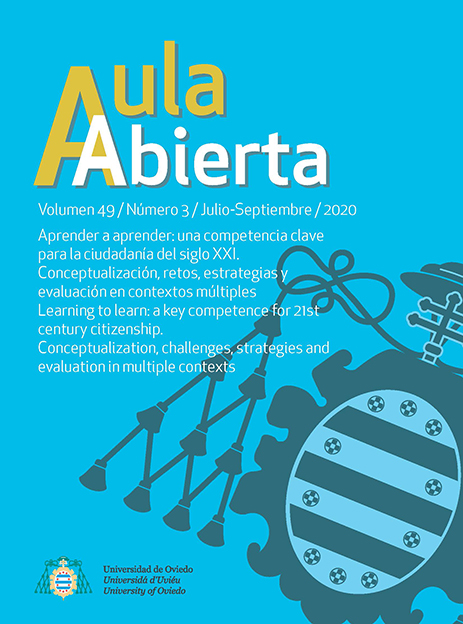Abstract
The fast-paced changes and the uncertainty inherent in a liquid society make it more than ever necessary for students to acquire the learning to learn competence. This paper presents an international search following a qualitative approach in which, using interviews as a method for data collection, 80 Italian, Spanish and Uruguayan teachers have participated. The study aims to find out which are, from a teacher’s perspective, the defining characteristics of Generations Z and Alpha that currently attend school and how they learn, subsequently inferring the main lines of action to enhance learning to learn. The teachers of the three participating countries agree that students nowadays are remarkably different from those of years ago. They mention fascination with social media and low frustration tolerance, as well as a shorter attention span and an urge for immediacy. Following the results, the main lines of action to promote the learning to learn competence in schools are indicated.
Key words: Generation Z, Generation Alpha, learning to learn, competences, teachers.
References
Alberici, A. (2008). La possibilità di cambiare. Milano: Franco Angeli.
Álvarez, E., Heredia, H y Romero, M. (2019). La Generación Z y las Redes Sociales. Una visión desde los adolescentes en España, Revista Espacios, 40 (20) 1-13.
Battiston, G. (2017). Zygmunt Bauman. Modernidad y globalización. Entrevista de Giuliano Battiston (Trad. A. C. Cabrera).Villa María, Córdoba: Eduvim.
Bauman, Z. (2006). Modernidad líquida. Buenos Aires: FCE.
Bauman, Z. (2008). Los retos de la educación en la modernidad líquida. Barcelona: Gedisa.
Bauman, Z. (2009). Amor líquido. Acerca de la fragilidad de los vínculos humanos. Madrid: FCE.
Brito, H. A., y Malheiro, A. (en prensa). Desarrollo de una entrevista sociocultural a docentes sobre Aprender a Aprender: Negociación de contenidos, traducción, adaptación y piloteo, Aula Abierta.
Camusso, P.M. (2019). ¿Cuáles son algunas de las características de la modernidad líquida que ponen en tensión cómo seducir a los estudiantes?, Voces de la educación, 4, (8), 17-27.
Cigdem, A y Feyza, K. (2020). An analysis of the preschool Teachers' views on alpha generation. European Journal of Education Studies, 6, 123-140.
Deakin Crick, R. Stringher, C. y Ren, K. (2014) Learning to Learn: International Perspectives from Theory and Practice. Routledge: London.
De Matos,E., Dias, L y Páramo, M. B. ( 2017). Ideas para la organización y planificación del ambiente de Educación Infantil con el fin de favorecer el aprender a aprender: banco de imágenes. En Páramo, M.B. (coord). Conociendo el aprender a aprender y su metamorfosis en Educación Infantil (pp. 165-180). Madrid: La Muralla.
Fernández Enguita, M. (2001). Educar en tiempos inciertos. Madrid: Morata.
Franco, R. (2001). sociología del desarrollo, politicas sociales y democracia. Estudios en homenaje a Aldo E. Solari. Montevideo: Siglo XXI Editores.
García-Lastra, M. (2013). Educar en la sociedad contemporánea. Hacia un nuevo escenario educativo. Convergencia. Revista de Ciencias Sociales, 62, 199-220.
Giddens, A. (2005). Un mundo desbocado. Los efectos de la globalización
en nuestros días. Madrid: Taurus.
Hautamaki J. y Kupiainen S., (2014). Learning to learn in Finland. Theory and policy, research and practice in Deakin Crick R., Stringher C., Ren K. (Coord). Learning to learn International perspective from theory and practice. (pp. 170-195). London: Routledge.
Inglehart, R. (1998). La società postmoderna, mutamento, ideologie e valori in 43 paesi. Roma: Editori Riuniti.
McCrindle, M. (2014). The ABC of XYZ : understanding the global generations. Sydney: UNSW Press.
Morin, E. (2002). El método, Tomo 1: la naturaleza de la naturaleza. Madrid: Ed. Cátedra.
Mut, A., y Morey, M. (2008). Preferencias en el uso de Internet, televisión, videoconsolas y teléfonos móviles entre los menores de las Islas Baleares. Edutec, 27. doi: http://dx.doi.org/10.21556/edutec.2008.27.460
Nagy, Á. y Kölcsey, A. (2017). Generation Alpha: Marketing or Science?. Acta Technologica Dubnicae, 7(1), 107-115.
Pérez-Escoda, A., Castro-Zubizarreta, A. & Fandos, M. (2016). Digital Skills in the Z Generation: Key Questions for a Curricular Introduction in Primary School. Comunicar, 49, 71-79. https://doi.org/10.3916/C49-2016-07
Rampazi, M. (2002). L'incertezza quotidiana: politica, lavoro, relazioni nella società del rischio. Milano: Guerini Associati
Torti, D. (2019). Building a semi-structured interview aimed to approach teacher representations on learning to learn in different cultural contexts (pp. 90-93). Proceedings of the 1st International Conference of the Journal Scuola Democratica Education And Post-Democracy (5-8 June 2019 Cagliari Italy) Vol. I “Politics, Citizenship, Diversity and Inclusion”.
Vilanova, N. y Ortega, I. (2018). Generación Z, todo lo que necesitas saber sobre los jóvenes que han hecho viejos a los millennials. Barcelona: Plataforma actual.

